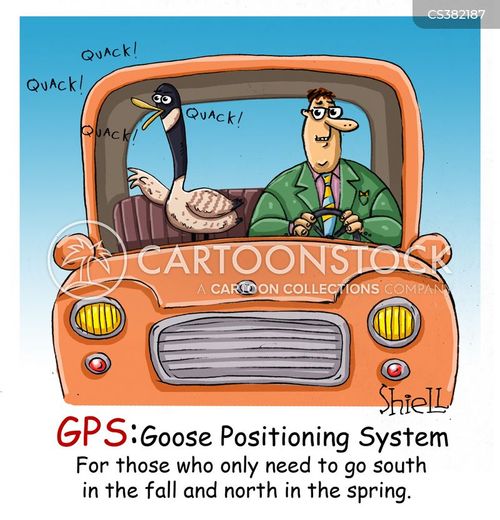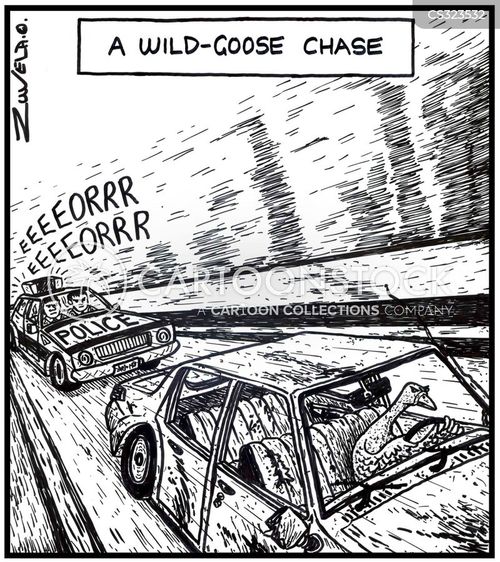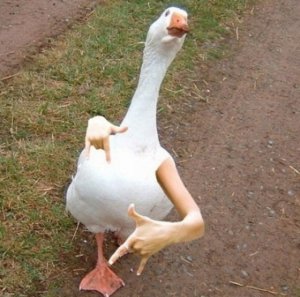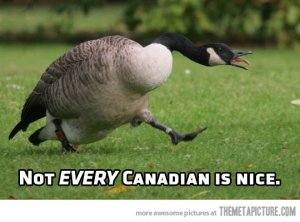You are using an out of date browser. It may not display this or other websites correctly.
You should upgrade or use an alternative browser.
You should upgrade or use an alternative browser.
Honk, If You Like Geese!
- Thread starter Meanderer
- Start date
RadishRose
SF VIP
- Location
- Connecticut, USA
Meanderer
Supreme Member
Falcon
DV8
- Location
- So. California
What's the difference between a snake and a goose?
One is an asp in the grass.
The other is a grasp in the ass.
One is an asp in the grass.
The other is a grasp in the ass.
What Exactly Is a “Wild Goose Chase”?
Meaning: A hopeless quest
"Originally, a 'wild goose chase' was a horse race [originating in the 16th century], in which a leading rider would head off into a field and make an especially challenging, winding course through the surrounding land. A second rider would then have to follow, retracing the first rider's steps exactly and copying his every twist and turn, no matter how difficult, as they chased after him. A third rider would then set out after the second, and then a fourth and so on, until an entire group of of riders was tracking one another through the countryside, all retracing the leader’s steps.
This method of horse racing—which was perhaps originally used as a means of challenging younger or less experienced riders’ horsemanship—became known as a 'wild goose chase,' as each rider in the group precisely follows the one in front, just as a flock ... of geese neatly follow one another in a V shape in the sky. A wild goose chase featured an evasive leader, trying to trick everyone. No one knew what move was coming next, so it was impossible to prepare.
What has long been credited as the earliest written record of a wild goose chase came from William Shakespeare’s Romeo and Juliet:
Mercutio: 'Nay, if our wits run the wild-goose chase, I am done, for thou hast more of the wild-goose in one of thy wits than, I am sure, I have in my whole five.'
Mercutio is complaining about losing a battle of wits to Romeo, while they wander the streets of Verona waiting to meet with Juliet’s nurse. Because this was thought of as the phrase’s earliest written record, the origin of the wild goose chase has long been credited to Shakespeare and merely chalked up to just another of his many literary inventions. But in fact it’s more likely that Shakespeare was playing on an already established term—a term that has its roots ... in hunting with horses."
Meaning: A hopeless quest
"Originally, a 'wild goose chase' was a horse race [originating in the 16th century], in which a leading rider would head off into a field and make an especially challenging, winding course through the surrounding land. A second rider would then have to follow, retracing the first rider's steps exactly and copying his every twist and turn, no matter how difficult, as they chased after him. A third rider would then set out after the second, and then a fourth and so on, until an entire group of of riders was tracking one another through the countryside, all retracing the leader’s steps.
This method of horse racing—which was perhaps originally used as a means of challenging younger or less experienced riders’ horsemanship—became known as a 'wild goose chase,' as each rider in the group precisely follows the one in front, just as a flock ... of geese neatly follow one another in a V shape in the sky. A wild goose chase featured an evasive leader, trying to trick everyone. No one knew what move was coming next, so it was impossible to prepare.
What has long been credited as the earliest written record of a wild goose chase came from William Shakespeare’s Romeo and Juliet:
Mercutio: 'Nay, if our wits run the wild-goose chase, I am done, for thou hast more of the wild-goose in one of thy wits than, I am sure, I have in my whole five.'
Mercutio is complaining about losing a battle of wits to Romeo, while they wander the streets of Verona waiting to meet with Juliet’s nurse. Because this was thought of as the phrase’s earliest written record, the origin of the wild goose chase has long been credited to Shakespeare and merely chalked up to just another of his many literary inventions. But in fact it’s more likely that Shakespeare was playing on an already established term—a term that has its roots ... in hunting with horses."
Katybug
Senior Member
- Location
- Charlotte, NC
It's fun going to the lake to feed them with little ones, but those who live around them loathe it.
Great thread!!!!
Great thread!!!!
RadishRose
SF VIP
- Location
- Connecticut, USA
This is interesting, Meanderer, The sidebar in the enlargement states-
"Narrative description: American Revolution, peace negotiations. Charles Fox wished to acknowledge American independence immediately, while Shelburne wanted to wait and use it as a tool to bargain with France. Fox was accused of excess sympathy for America. Images include: Charles Fox as a fox; Fox's supporters as geese; British ships. "
"Narrative description: American Revolution, peace negotiations. Charles Fox wished to acknowledge American independence immediately, while Shelburne wanted to wait and use it as a tool to bargain with France. Fox was accused of excess sympathy for America. Images include: Charles Fox as a fox; Fox's supporters as geese; British ships. "
RadishRose
SF VIP
- Location
- Connecticut, USA
Meanderer
Supreme Member
Thanks, Rose! I liked the image,initially, and later saw that there is a deeper story. See link for Charles James Fox BRITISH POLITICIANThis is interesting, Meanderer, The sidebar in the enlargement states-
"Narrative description: American Revolution, peace negotiations. Charles Fox wished to acknowledge American independence immediately, while Shelburne wanted to wait and use it as a tool to bargain with France. Fox was accused of excess sympathy for America. Images include: Charles Fox as a fox; Fox's supporters as geese; British ships. "
RadishRose
SF VIP
- Location
- Connecticut, USA
I was unaware of this Mr. Fox, but having read your link I see he had quite a career and admired freedom. I wonder why he had to marry his wife in secret though. Thanks, Meanderer.
Greyson
Member
- Location
- Margate England
Keep in step ...


Meanderer
Supreme Member
Rose, here's a link on Elizabeth Armistead.I was unaware of this Mr. Fox, but having read your link I see he had quite a career and admired freedom. I wonder why he had to marry his wife in secret though. Thanks, Meanderer.
RadishRose
SF VIP
- Location
- Connecticut, USA
How cute that little band is, Greyson.
RadishRose
SF VIP
- Location
- Connecticut, USA
Rose, here's a link on Elizabeth Armistead.
She certainly got around! It was nice to see however, she ended up being a very nice and benevolent lady. Thanks. (I couldn't open your link, so I just went to Wikipedia)














